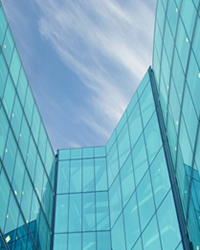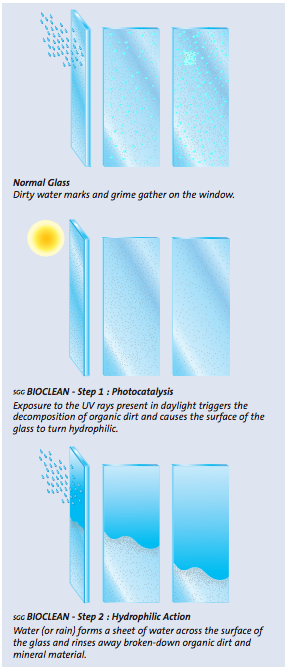




Self-cleaning glasses have become an integral part of production ranges in recent years. However, there are various approaches available both with regard to durability of the coating and with regard to their operating principles. In general it must be noted that it is not the case that self-cleaning glasses never need to be cleaned again, however the cleaning intervals are increased significantly depending on the product.
Depending on the application, a UV-resistant, titanium oxide layer is available that is permanently fired into one of the surfaces during the float glass manufacturing process, depending on the manufacturing process, and that provides amazing properties.The UV radiation of the day light impinging on this layer will decompose any kind of organic dirt in a continuous process. Moreover, the layer is hydrophilic (Greek: water-friendly) which means that a rain shower will not flow down the glass pane in the form of drops but in the form of a water film that rinses the pane and flushes away the decomposed dirt. The essential condition for this photo-catalytic and hydrophilic effect to function is the unobstructed exposure of coated glass to natural UV and water.
This significantly minimises the cleaning effort both in residential applications and with large facade glazing, as the glass handles most of the cleaning chore itself. The titanium oxide layer is very durable and resistant to environmental influences.
The disadvantage of this layer is that due to the requirement for UV radiation it can only be used for outdoor applications. Moreover, the layer is incompatible with silicone oils, neutralising the hydrophilic property. Special requirements for the glazing systems up to the window seals therefore apply. Alternatively, hydrophobic (Greek: water-fearing), i.e. water-repellent coatings, are available. These layers are based on chemical nano-technology and are characterised by very high degrees of abrasion resistance and a high resistance to conventional cleaning agents. Due to their excellent UV stability, these layers can also be applied in outdoor areas. Both coating systems generate the so-called 'lotus effect' that significantly simplifies cleaning of the glass surfaces. NGT would be happy to recommend the optimum coating for you to match your requirements.
The self-cleaning coating is permanently connected to the glass surface and has very good durability and long service life. As with any type of coated glass, specific issues must be considered for installation and maintenance.
In order to prevent damage, the layer must not come into contact with hard objects. Any scratches might impair functionality.
Recommended tools